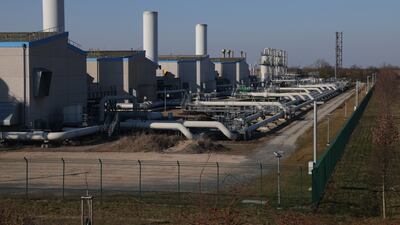Live updates: follow the latest news on Russia-Ukraine
European countries will consider jointly buying natural gas in a strategy modelled on the acquisition of coronavirus vaccines as they look to end the reliance on Russian imports that has raised fears of power cuts.
As fallout from the war in Ukraine forces a rethink of Europe’s energy strategy, businesses in Germany have been holding talks with regulators to prepare for potential gas shortages if Russia turns off the tap next winter.
The talks have looked at a worst-case scenario where industry has to shut down in Europe’s largest economy because household consumers would be given priority for scarce energy rations.
“It’s about being prepared for a situation that we hope never arises,” said Klaus Mueller, president of Germany’s Federal Network Agency, which regulates electricity and gas markets.
Germany is among the countries already making overtures to the Gulf to fill the gap, but future purchases could be made jointly with all 27 members of the EU in the latest step towards integration.
The proposal will be considered by EU leaders at a summit in Brussels this week, where US President Joe Biden will make a guest appearance after talks with Nato leaders across town.
“Europe should definitely use better its enormous weight, the scale of our European economy when it comes to the negotiating of energy prices,” said Maros Sefcovic, a senior member of the European Commission.
Mr Sefcovic said Europe should draw lessons from its joint procurement of vaccines, which was criticised when the UK and US raced ahead of the bloc in early immunisations but has since been hailed as a success by the EU.
There are also suggestions that joint purchasing could be extended to hydrogen and liquefied natural gas, fuel sources that could be shipped from overseas and thereby reduce Europe’s dependence on Russian pipelines.
The port of Rotterdam aims to become the hub of hydrogen imports in Europe and is exploring potential deliveries from countries including Iceland, Australia and Canada.
Germany is planning to build two LNG terminals to handle the low-temperature imports from potential suppliers such as the US and Qatar, while also speeding up its expansion of solar and wind energy.
"We will end this dependence as quickly as possible,” German Chancellor Olaf Scholz told MPs on Wednesday.
However, Berlin has so far held out against an immediate EU embargo on energy imports from Russia, arguing that the social and economic consequences might make such a measure unsustainable when fuel prices are already high.

That debate is likely to resume at the EU summit on Thursday and Friday, with the US announcing that another package of sanctions will emerge from the diplomatic showdown. The talks are also expected to address the humanitarian fallout of the war.
Russia provides about 45 per cent of gas and coal and 25 per cent of oil supplies to the EU, with some ministers complaining that Europe is effectively financing Moscow’s onslaught on Ukraine.
The European Commission has been tasked with drawing up proposals to eliminate this reliance on Russian fossil fuels and says it could be achieved before 2030.
One idea being floated by the commission is to require a minimum level of gas storage before winter that would prevent what Mr Sefcovic called a scramble for energy in December and January.
The legislation under discussion would require countries to have their gas terminals 90 per cent full at the start of November, he said, preparing them for either geopolitical shocks or severe weather.
Germany's stocks have fallen as low as 35 per cent in recent months amid suspicion that the Kremlin has already begun using gas as political leverage.
Berlin sees next winter as the potential flashpoint but has ruled out postponing the December 2022 switch-off date for its last three nuclear reactors, which it says would make little difference and be technically difficult to keep online.












































